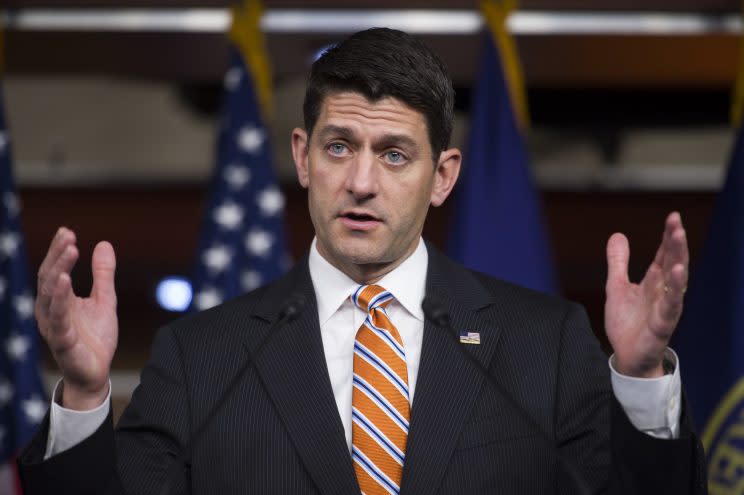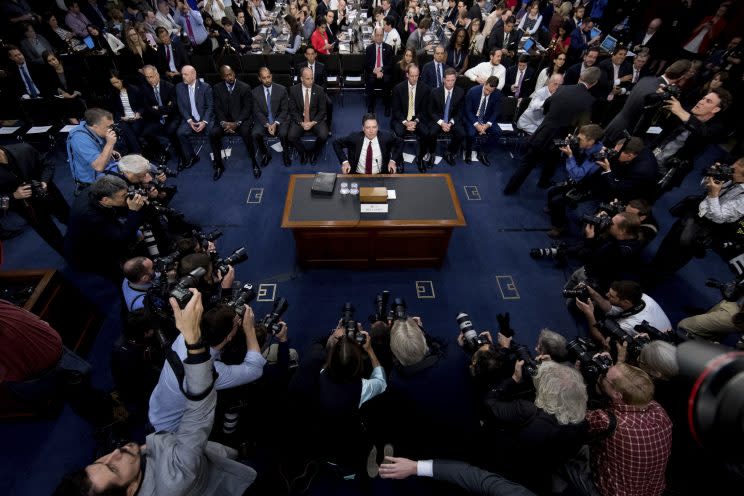House Republicans working on key bill struggle to escape Comey's shadow

WASHINGTON — It was supposed to be House Speaker Paul Ryan’s big day.
On Thursday, House Republicans passed the crown jewel of their regulatory reform package: the Financial Choice Act, which undoes many of the regulations in the 2010 Dodd-Frank law that was intended to reform Wall Street after the financial crisis. The bill, which guts one of President Barack Obama’s legislative legacies, will soon head over to the Senate for consideration.
But the attention of the political world was focused on a Senate office building just blocks away, where ex-FBI Director James Comey testified on conversations he had with President Donald Trump in which the president asked him to drop an investigation into his former top adviser Michael Flynn.
The testimony dominated the national conversation throughout the day, and cable news covered the event uninterrupted — by commercials or any other political topic. Comey said he took the president’s words as a direct order, testimony that suggests concerns about the president’s conduct and potential obstruction of justice are not going away anytime soon.
Even though his weekly press conference had half as many reporters as normal, Ryan insisted that the political circus down the block would in no way prevent his caucus from pursuing key issues, including the Financial Choice Act.
“We can chew gum and walk at the same time,” Ryan said, one of the speaker’s go-to phrases when asked by reporters these past few months about distractions from the White House.
But the speaker also showed signs of frustration that Comey’s hearing was receiving the overwhelming attention, especially as Ryan asserted that the testimony vindicated Trump. Comey excoriated Trump during the hearing, but he confirmed telling the president that he was not personally under investigation.
“We’re bringing the Choice Act to the floor today, we are replacing Dodd-Frank today,” Ryan told reporters. “We have been working on the problems that American people are facing and delivering on the promises that we made during the campaign so we can improve their lives. And that is why is the president is frustrated, because these are the questions being asked [about Comey] while there is a lot to be done.”
Rank-and-file Republicans readily acknowledge that the media coverage from Comey’s hearing would dwarf that of their own work. Rep. John Ratcliffe, R-Texas, said that many Americans will just be following the media’s lead and focus on Comey.
“No doubt [Americans are] watching Director Comey today because they have to, it’s being covered by every major network,” Ratcliffe said, adding that the coverage of the Financial Choice Act will not match the media frenzy surrounding Comey’s testimony.

But that bill, which Ryan calls one of the “crown jewels” of the House GOP agenda, could have major implications for the financial sector. It gives the president sweeping power to fire the heads of the Consumer Financial Protection Bureau, a watchdog group formed under Dodd-Frank, and the Federal Housing Finance Agency, which helps regulate mortgage powerhouses Fannie Mae and Freddie Mac.
The bill exempts some banks from Dodd Frank’s liquidity requirements that required them to hold a certain amount of cash on hand and replaces Dodd-Frank’s system for dealing with failing banks entirely.
Conservatives say the bill will help achieve more robust economic growth and empower smaller banking institutions.
“If you support financial opportunity for all, taxpayer funded bailouts for none, less regulations for small, community financial institutions and more accountability and transparency, you will support this bill, support consumers and support Main Street Americans,” Rep. Roger Williams, R-Texas, said on the House floor Thursday.
But Democrats say the bill would pave the way for another financial crisis, arguing it destroys consumer protection and that the protections in Dodd-Frank were crucial to maintaining the stability of the financial industry.
“This bill unleashes, once again, the opportunity for [the financial industry] to act in a way that is not in the interest of consumers, not in the interest of investors and certainly not in the interest of taxpayers,” House Minority Leader Nancy Pelosi, D-Calif., told reporters Thursday.
The bill has an uncertain future in the Senate, where Republicans must decide whether to craft a major banking bill of their own or use the process of reconciliation, which reduces the threshold needed to pass a bill to 50 votes, to tackle smaller reform.
Either way, the process will take time. Sen. Mike Crapo, R-Idaho, is spearheading the effort and has said he will attempt to roll out banking reform legislation early next year. Yet even Senate Republicans say they are struggling to get their own message out of the shadow of the Russia probe, meaning bills like the Financial Choice Act may remain in the background.
“It [Comey’s testimony] is sucking up all of the air in the room,” Sen. John McCain, R-Ariz., told reporters Thursday.
Additional reporting by Liz Goodwin in Washington.


